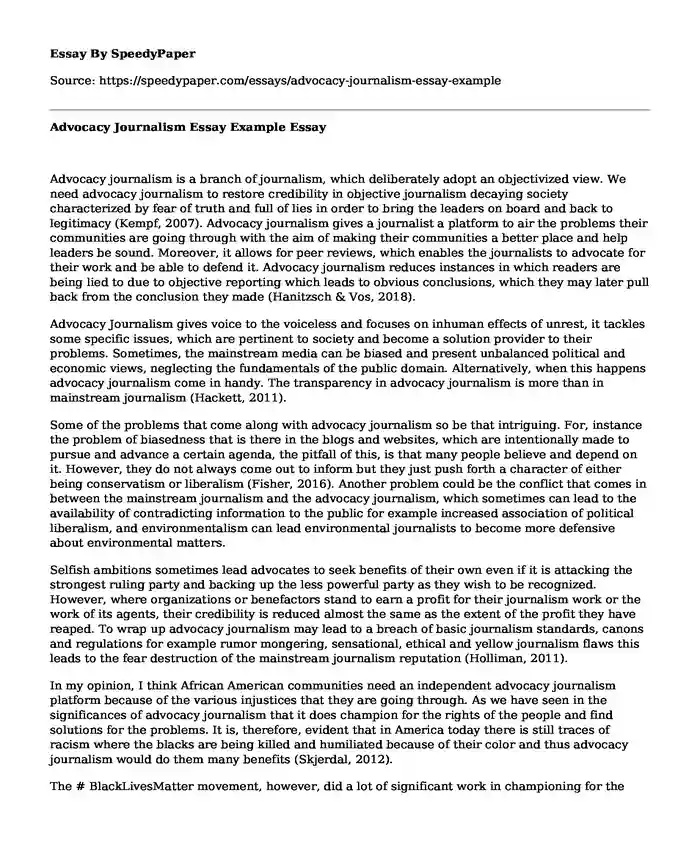Advocacy journalism is a branch of journalism, which deliberately adopt an objectivized view. We need advocacy journalism to restore credibility in objective journalism decaying society characterized by fear of truth and full of lies in order to bring the leaders on board and back to legitimacy (Kempf, 2007). Advocacy journalism gives a journalist a platform to air the problems their communities are going through with the aim of making their communities a better place and help leaders be sound. Moreover, it allows for peer reviews, which enables the journalists to advocate for their work and be able to defend it. Advocacy journalism reduces instances in which readers are being lied to due to objective reporting which leads to obvious conclusions, which they may later pull back from the conclusion they made (Hanitzsch & Vos, 2018).
Advocacy Journalism gives voice to the voiceless and focuses on inhuman effects of unrest, it tackles some specific issues, which are pertinent to society and become a solution provider to their problems. Sometimes, the mainstream media can be biased and present unbalanced political and economic views, neglecting the fundamentals of the public domain. Alternatively, when this happens advocacy journalism come in handy. The transparency in advocacy journalism is more than in mainstream journalism (Hackett, 2011).
Some of the problems that come along with advocacy journalism so be that intriguing. For, instance the problem of biasedness that is there in the blogs and websites, which are intentionally made to pursue and advance a certain agenda, the pitfall of this, is that many people believe and depend on it. However, they do not always come out to inform but they just push forth a character of either being conservatism or liberalism (Fisher, 2016). Another problem could be the conflict that comes in between the mainstream journalism and the advocacy journalism, which sometimes can lead to the availability of contradicting information to the public for example increased association of political liberalism, and environmentalism can lead environmental journalists to become more defensive about environmental matters.
Selfish ambitions sometimes lead advocates to seek benefits of their own even if it is attacking the strongest ruling party and backing up the less powerful party as they wish to be recognized. However, where organizations or benefactors stand to earn a profit for their journalism work or the work of its agents, their credibility is reduced almost the same as the extent of the profit they have reaped. To wrap up advocacy journalism may lead to a breach of basic journalism standards, canons and regulations for example rumor mongering, sensational, ethical and yellow journalism flaws this leads to the fear destruction of the mainstream journalism reputation (Holliman, 2011).
In my opinion, I think African American communities need an independent advocacy journalism platform because of the various injustices that they are going through. As we have seen in the significances of advocacy journalism that it does champion for the rights of the people and find solutions for the problems. It is, therefore, evident that in America today there is still traces of racism where the blacks are being killed and humiliated because of their color and thus advocacy journalism would do them many benefits (Skjerdal, 2012).
The # BlackLivesMatter movement, however, did a lot of significant work in championing for the rights of the black people (Garza, 2014). The reason to why I stand for advocacy journalism is because normally, objective journalism will just give information about a problem while advocacy goes forth to champion for the rights of the people in the society and also condemn social injustices, while, in the same magnitude find solutions for the same. With advocacy, it has proved to have worked in various instances including soldiers without swords black press and many others.
References
Fisher, C. (2016). The advocacy continuum: Towards a theory of advocacy in journalism. Journalism, 17(6), 711-726.
Garza, A. (2014). A herstory of the# BlackLivesMatter movement. Are all the women still white, 23-28.Hackett, R. A. (2011). New vistas for peace journalism: Alternative media and communication rights. Expanding peace journalism: Comparative and critical approaches, 35-69.
Hanitzsch, T., & Vos, T. P. (2018). Journalism beyond democracy: A new look into journalistic roles in political and everyday life. Journalism, 19(2), 146-164.
Holliman, R. (2011). Advocacy in the tail: Exploring the implications of 'climategate'for science journalism and public debate in the digital age. Journalism, 12(7), 832-846.
Kempf, W. (2007). Peace journalism: A tightrope walk between advocacy journalism and constructive conflict coverage. Conflict & communication online, 6(2).
Skjerdal, T. S. (2012). The three alternative journalisms of Africa. International Communication Gazette, 74(7), 636-654.
Cite this page
Advocacy Journalism Essay Example. (2022, Nov 30). Retrieved from https://speedypaper.net/essays/advocacy-journalism-essay-example
Request Removal
If you are the original author of this essay and no longer wish to have it published on the SpeedyPaper website, please click below to request its removal:
- Free Essay Example: To Write. To Read. To Live
- Entrepreneurship
- Free Essay: Greenhouse Gas Production from Construction and Operation of Pavements
- Annotated Bibliography Example on Sociological Issues
- Literary Essay Example: Bread Givers by Anzia Yezierska
- Essay Example: Challenges of Organization Theory and Design
- Free Essay Sample: Challenges of Creative Entrepreneurs
Popular categories





